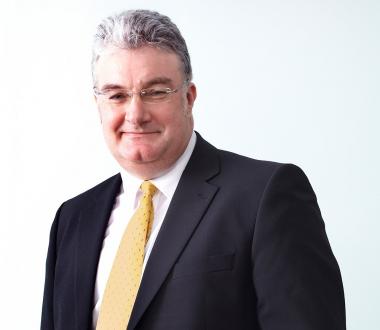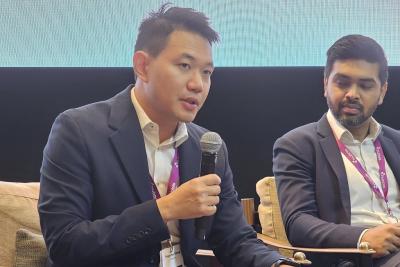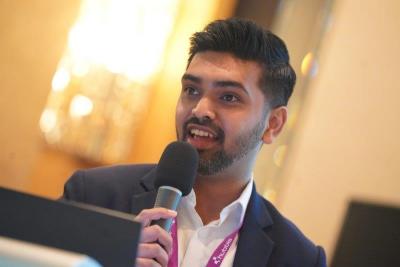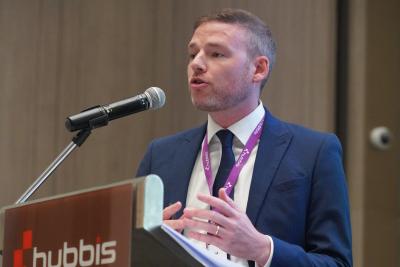MBMG’s Paul Gambles on the Art and Science of Independent Wealth Management
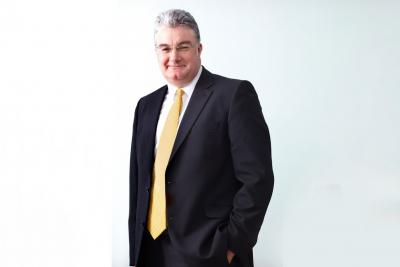
Aug 12, 2020
Bangkok-headquartered MBMG Group was founded back in the mid-1990s by Paul Gambles and Graham Macdonald, who had both set foot in Thailand for the first time in 1994. Some quarter of a century later, Macdonald has retired, but Gambles still plies his trade as the leader of what is one of the best-known financial services practices in the country including its fee-based wealth division, MBMG Investment Advisory. Hubbis caught up with Gambles at his Bangkok home office via video link to hear of his views on the world of investments for private clients in Thailand and to learn how he is helping position client portfolios for the extraordinary conditions prevailing today, and the thoroughly uncertain times ahead.
Gambles is a Director of MBMG Investment Advisory, which is the Thailand SEC-licensed fee-based wealth division of diversified financial services provider, MBMG Group, itself a member of the GGI Group, the 6th largest global professional services group. Gambles himself is licensed by the SEC as both a Securities Fundamental Investment Analyst and an Investment Planner.
Today, MBMG Investment Advisory (MBMG) boasts assets under advice of roughly USD1.5 billion spread amongst less than 100 private clients, corporate clients, family offices and institutional clients. Going into the lockdown, the group had grown to over 50 employees based mainly at its HQ in Bangkok, and its office in Hua Hin, a prosperous resort on the Gulf of Thailand.
Gambles has long believed in and striven towards a fee-based revenue model, having redirected its business towards that back in 2012 in the aftermath of the global financial crisis. MBMG is today a fee-only firm, and Gambles reports that clients stay with him, or move to MBMG, not only because they’re seeking advice to enable them to achieve outperformance above the indices, but also because the use of bespoke risk-management personalised to their situations means they can sleep easier at night, rather than suffering the emotional roller-coaster of watching and then often reacting to the often remarkably sharp movements in the markets. That has been even more the case since the pandemic hit, first with such stealth and then more pervasively.
The slow evolution
“Before the GFC,” he recalls, “the wealth industry here was entirely driven by a pay to play mentality, with revenues directly related to transactions, but, with the support of the authorities here – the SEC was at the forefront of the local move towards fee-based advisory at that stage, reflective of the global shift – we made the bold step to evolve our business model.”
He knew from the outset, and he still knows today, how tough it is for Thai investors, and indeed most investors in Asia, to accept the need to pay fees for financial advice and services. But eight years on, he reports that the uptake has been good, better even than he and colleagues had hoped for.
Seeking stability
He explains that it has been helpful to see the region’s regulatory community striving towards this type of revenue model, in order to help stabilise revenues amongst financial institutions, and perhaps even with the aim of helping encourage investors to take more of a medium to long-term view of their portfolios.
Gambles says the MBMG ongoing revenue model and approach to portfolio allocation has been validated even more strongly amidst the carnage of the markets back in March and April, and as Thailand’s economy remains in lockdown, with its enormous tourism industry reduced to virtual inactivity.
Proven validity
“The scale of disruption makes attempts to calibrate data and reliably generate forecasts impossibly challenging and attempts to find precedents for H2 2020 confusing and contradictory,” he comments. “For us in the wealth management profession, especially for our fee for advice model, this is a real challenge. We do not have any inside track that helps us better understand which outcome is most likely to occur or when – a strong recovery, or further crises and collapses.”
“However,” he extrapolates, “we do have a couple of distinct advantages over most private banks or institutional wealth managers right now. Many of my corporate, institutional and private clients have been clients of the group for most, and in some cases all, of the time since the group was founded at the end of 1995, and we have gone through crises together and there is a solidity of belief and purpose in all members of the current team and amongst those clients.”
“We have a deep understanding of and respect for these clients, their families, their people and their hard-earned wealth. And that means we are close enough to the clients to focus on risk and to exclude exposures that might produce unpalatable outcomes. That might mean missing out on some opportunities, but the old adage of better safe than sorry is utterly true and pertinent, especially in such unprecedented times like today.”
Knowing your clients
He adds that it is the intimacy that his key client-facing team members have with their clients that helps put them in the position of being able to make and then adjust dynamically risk impact assessments that are highly personal, highly tailored.
“The competitors out there, the private banks for example, simply cannot do this, it would not work, they do not have a scalable model for bespoke advice and bespoke offerings,” he comments. “And the proof for us and our clients is that in fact 2020 has been a great year for our active asset allocation approach, with MBMG IA’s range of private bank advisory portfolios producing gains of between 2.22% to 15.56% in the first 6 months of 2020.” And as of 31 July, the number is between 4.77% to 19.19%, reports Gambles.
He explains that MBMG is not taking views on which way the economic recovery will head, or not, either locally or globally.
“Risk management means allowing for the upside and downside,” he says, “but a benefit of sitting on the fence is that when it does become clearer, you can jump to one side of the fence or the other. When the price of oil started to fall, our client portfolios started building small positions – when the oil price went negative, it was clear that there was an opportunity to increase these. Sitting tight and holding on might have helped people recover 40% losses back to much smaller losses. Being able to actively produce alpha for each client, all the time within the clients’ risk mandate, helped portfolios produce positive results.”
No crystal ball
He reiterates that there is no magic wand or crystal ball. “We try to understand how different scenarios impact each client and make sure that they understand this and are aligned with the most appropriate ones and exclude inappropriate ones,” he elucidates. “That gives us a lot of room to then respond to rapidly changing environments actively, like so far this year, which is when a lot of alpha can be generated. It is not scalable; it is utterly bespoke, utterly tailored to each client.”
Risk matters
Gambles offers some of his thoughts on wealth advisory. “Everyone tends to focus on return, which is outside their control, whereas they should focus on risk,” he observes. “And it is risk where we can make a huge difference. However, we all find it really hard to talk about this in a way that attracts attention so as a profession we waste our own time and everyone else’s by talking about returns which are at best irrelevant to what we can actually deliver and at worst a really dangerous rabbit hole to go down.”
The second problem, he explains, is the conflict of interest. “If people worked out where they can add value to clients and then look for the clients to share that value add by charging them fees, everyone would be in a much better place than if the industry continues to start the client proposition by looking at ways it can monetise,” he argues.
“We should see ourselves more like doctors – diagnose and treat and charge fees for doing so, rather than thinking of ways to generate profits for ourselves and having to wrap that up in unrealistic dreams. Risk management is actually as much art as science – when done properly, it’s basically as much to do with scenario planning as with formulae and narrow models.”
Getting the message right
But he also concedes that he and colleagues are sometimes as guilty as everyone else. “It is a reality that when people ask how our private bank external advisory portfolios are doing this year, I’m as likely to respond that they were up between X and Y% in the first six months. Actually, what I should be saying is across all private bank advisory clients almost 92% of months this year were positive,” says Gambles, with this number exceeding 92.8% as of July 31, he reports, “and the worst observed drawdown was less than minus 3% and that we are driven by helping clients not lose money, to avoid nasty shocks by building sound portfolios. But that does not sound so exciting. Actually, what we do is on a per-client basis, understand their risk tolerances and make sure they never breach those levels, while enabling them to build balanced portfolios that are both robust and offer upside potential.”
Gambles is a firm believer in the value of the boutique approach from firms such as MBMG. “I really do believe that from all I have seen over the past 25 years doing this here that the bigger institutions really struggle to personalise and to offer anything truly bespoke. Yet the size of those institutions keeps increasing, and consolidation appears to be the way the industry will keep going.”
The pandemic, Gambles comments, has created similar challenges throughout the industry, most fundamentally the inability to meet with clients, seemingly a lynchpin of wealth management for the upper tiers of wealth since the industry opened its doors.
Empathy required
“But irrespective of the mode of delivery, the key is to understand the clients and deliver a local, tailored, personalised service, and in that regard, we are, I believe, simply far better than the big financial institutions. The most responsive of the larger financial institutions are those who actually take input from the ground up and try to generate policy, try to generate products, try to generate services, generate client solutions that are entirely relevant and individualised. And luckily for us, that seems to be a minority, so there is a major role for us to play, we are not being pushed aside, or made irrelevant. In fact, far from it.”
Although there is a global, regional and local trend towards consolidation, Gambles argues that the pandemic has proven yet again the immense value of a more personal communication and genuine two-way relationship, and then being able to provide something that really is bespoke and really is tailored.
Winning ways
“We have actually taken on more new private banking clients in the first half of 2020 than in any other half year,” he reports. “They are largely coming from backgrounds where they have had typically private banking relationships where the RMs have been unable to satisfy the clients’ needs and expectations. Really, we hear that many banks are simply not listening to what they want and expect.”
To offer MBMG clients what Gambles and his team believe are the right solutions, he explains that they must factor their own utility of return and risk into every decision that they make. “That doesn’t fit into really simplistic models,” he observes, “as there are so many factors and nuances to each situation. But that is what we do, and because of that approach, the outcomes have been really tangible, the results, as I explained earlier, are there for our clients.”
The boutique approach
He adds that the MBMG model has never been about big marketing budgets, lavish events, and other jamborees; it has always been all about personalisation and tailoring. “Actually,” he says, “to keep clients coming through the doors our biggest challenge will be to make sure we stay small enough to keep doing all these local, personalised things. We are external, we are independent, we do not push product. Everything is paid in fees by the client, we don’t get paid for product distribution, not trailer fees, no retrocessions. In fact, by both regulation and practice, we are driven to act entirely in the clients’ best interests, and that is precisely what we do.”
Gambles explains that MBMG looks at the entire asset holdings of clients, including their business, property and financial assets. “We are paid a consulting fee to help clients understand the relationship between all these holdings, all the different income and capital gains streams, and then optimise the way that they structure all their financial affairs,” he explains.
He adds that this approach is very different from the product point of view, as institutions seeking fees from selling products are not going to pay much attention to other assets such as business assets or property assets. “They will simply be seeking to make a fee from selling an investment product,” he says, “and that plays precisely into our hands, and for our clients reinforces the value of the external model such as the one we offer.”
Gambles closes the discussion by reiterating that MBMG’s focus and its DNA will remain firmly driven by the clients’ need. “The events of 2020 have proven that we are taking the right approach,” he says. “Clients see our value even more clearly in times of fear and crisis. But we are there for them through good and bad times. That is our mission. That is our DNA.”
Gambles Key Priorities
Firstly, Gambles wants to keep investing in and enhancing new digital technologies. “Our approach is, we know, incredibly labour intensive because if you do something that is so personalised then by definition you are almost reinventing the wheel for every client and also it is very highly skilled and that is a real problem. To rise to the huge challenge of finding enough talent to be able to deliver this model, we have hired from outside the private bank world, tailoring remarkably smart and capable people and using technology to help empower them, to replace some elements too, in order to focus their time and skills at what we do best. So, people and technology are the key priority and the two are closely connected.”
Secondly, MBMG continues to develop its own risk models. “We have what we call ‘PRisM’, which is a way of measuring the risk of just about every single kind of asset you can think of, including the private businesses, property, financial assets and so forth,” he explains. “We spent a lot of time developing that and at a moment’s notice every day we can print off a risk measurement for each client showing them what their worst possible outcome is understood to be in any conceivable scenario.”
He reports that the clients love this, and it has worked incredibly well so far. “To be able to have one number that said if great depression number two broke out tomorrow I know that over the next 18 months I would lose perhaps 15% of the value of their assets but no more is actually really important to clients, and to us,” he elucidates. “The PRisM system actually worked really well through this year, although this virus moves the world into uncharted waters. And we are re-examining to make sure that there are no other unprecedented type events that might happen that might test PRisM beyond its limitations, but so far we haven’t found any. It is all about risk benchmarking and being absolutely bulletproof in any scenario.”
His third priority, which is more of an existential concern in reality, is that the wealth industry remains as diverse as possible. “Consolidation,” he says, “creates diminished competition and concentrates power in fewer and fewer hands. We need the banks, the platforms, the brokerages all to stay in business because we need them to be competitive with each other in terms of providing access to markets for clients. More consolidation in that sector removes competition and obviously events like this which could be existential threats for some businesses, whether they go out of business or get taken over or whatever, that could potentially remove competition and that’s not good.”
Getting Personal with Paul Gambles
Gambles is a passport holder of both the UK and the Republic of Ireland. After university in the UK, he spent nine years in corporate and asset finance in London. He first journeyed to Thailand in 1994, with his wife, Anna. They loved what they saw and the opportunities it presented at the time, and he set up the MBMG Group with Co-Founder, Graham Macdonald in late 1995.
His own range of expertise includes asset allocation, tax structuring and macro-economic analysis. He was a Full Technical Inspector at the UK Inland Revenue, and had then moved to the Bank of Scotland Group, Gambles holds the CFA Level 1 accreditation and he is licensed by the Thai SEC as both a Securities Fundamental Investment Analyst and an Investment Planner.
He is also a member of Advisory Board of IDEA Economics and is well-known as an expert commentator making monthly appearances as a guest host on CNBC’s Squawk Box Asia and Squawk Box Europe as well as Bloomberg’s Daybreak Asia and Daybreak Middle East. He has also authored or been featured in publications such as Forbes, Fortune, The Daily Express and contributed to websites such as Zerohedge, while also producing a number of highly regarded and widely cited academic papers.
For over a decade he has been a senior judge at the annual Mai Bangkok Business Challenge at Sasin; a competition where over 50 world-class universities from locations all around the globe present business plans and compete for His Majesty, the King of Thailand’s Award.
Gambles was born in Rotherham, South Yorkshire. “This is jokingly remembered as the place where pigeons fly backwards to avoid getting muck in their eyes apparently,” he quips. “It was very industrial when I grew up. I grew up in a pub – my father was a crane driver and union head at the steelworks and to keep him quiet, the steelworks gave him the cushy number of running the social club from which he progressed into the pub business.”
He recalls that while working at the steelworks, his father would wangle night shifts whenever there were horse race meetings in the north of England, and along with his uncle Harold, he formed Gambles & Gambles Bookmakers.
He studied at the University of Warwick, graduating in English and European Literature and History, then embarked on his career in the UK, but the real adventure, he says, has been in the years since opening MBMG some 25 years ago with MacDonald, now retired, but who was given the MBE for his services to British trade and charities.
He cites one of his finest achievements as keeping loyal team members, many of whom were there at the start of the adventure. “Our CEO, Janjira Sumanus, has been with us since we opened the doors of our first office,” he reports. “Some of the other key staff have been with us 20 years or more and many have been here more than a decade. I am proud of having managed to retain their faith in myself and the business for so long, and we are all proud of what we have built together.”
His wife Anna and he have two late teenage children, one a first-year university student in the UK and the second who can’t wait to become a first-year university student next year.
In his younger days, Gambles used to be active in a number of sports but his main exercise these days tends to be cycling, even in the oppressive heat of Thailand. In his more formative years, he also used to play keyboards - really badly, he says, - in a pub band, in the north of England in the late 1970s.
Gambles and family love Thailand and will stay for many years to come. “It is home,” he says, “it offers a wonderful lifestyle and wonderful people.”

Director at MBMG Group
More from Paul Gambles, MBMG Group
Latest Articles


